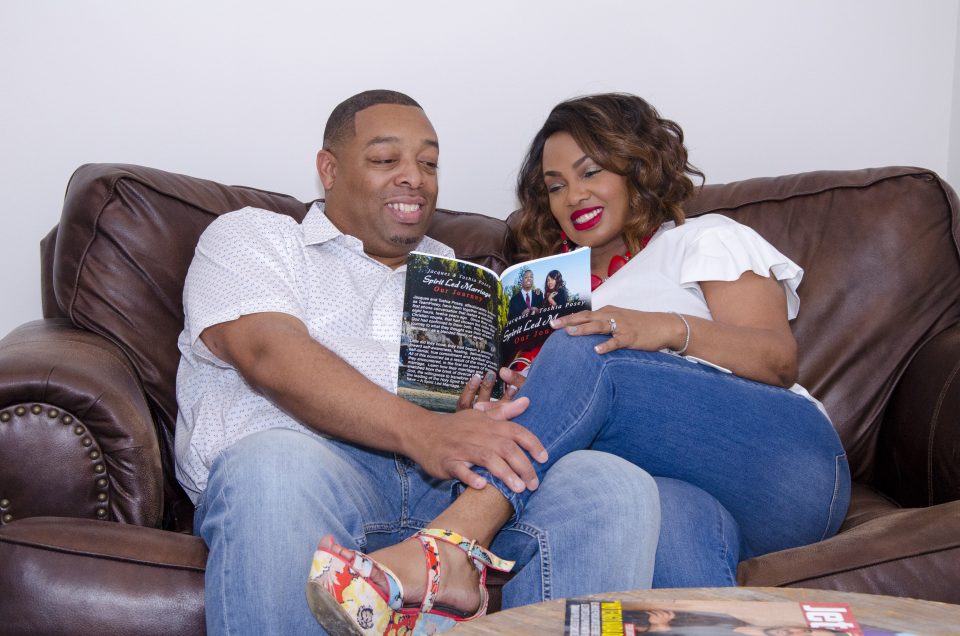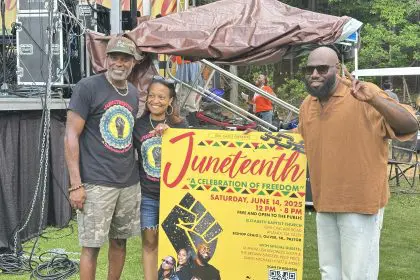
Meet the Poseys. Jacques is an author, inspirational speaker and coach, and his wife Toshia is an evangelist, author, speaker and coach. They are the co-authors of Spirit Led Marriage: Our Journey.
The couple met online in 2006 and had their first date at Golden Corral. They went Dutch, and the date lasted five hours. Coincidentally, a twice-married Jacques and once-married Toshia lived in the same apartment complex.
Through their Spirit Led Ministries, the Poseys provide Bible-centered coaching to help couples transform their marriages and relationships.
“Spirit Led Ministries helps couples to understand that they must renew their mind from the superficial values and customs of the world,” Jacques explains. “We help them to embrace what God has said about marriage and relationships in the Word of God, focusing on Godly values and ethical attitudes. We help them to identify where the transformation is needed to be implemented in their marriage and relationships so that they can live out God’s plan and purpose for themselves.”
Their vision for Spirit Led Ministries is “to see a fire ignited in every man, woman and couple that we encounter to live out God’s truths for them in their marriages and relationships,” Additionally, Toshia added.
During a recent sit-down with rolling out, the couple shared their perspective on managing finances, blended families and how infidelity opened their eyes.
What exactly do you mean when you say spirit-led marriage? Please explain.
Jacques: A spirit-led marriage means you have tried functioning in your marriage or relationship according to what you learned from your upbringing, life experiences and what we have heard in the streets, but it’s not working, and now you have made a conscious decision to function instead according to the Word of God and His values and ethical attitudes. Allowing the Holy Spirit to lead and guide you in all your ways.
What made you adopt this perspective?
Toshia: After years of negative communication and unresolved conflict, we landed on the brink of divorce. Not because we didn’t love each other or want to be in the marriage but because we didn’t know how to communicate properly, forgive ourselves and each other and heal from our pasts. Once we were faced with the decision to divorce or fight for our marriage, we decided to fight — but not fight each other, but [rather] fight the circumstances that we had faced for years.
Do you have children that were born outside of this union? If so, what are three best practices for a blended family?
Jacques: Yes, we have five sons. No biological children together. The first practice is to allow the children to bond on their own all the while being respectful to each other.
The second practice is to meet with the biological parents, if possible, to discuss a co-parenting plan. This is important to establish that no one is trying to replace the natural parent but to work together and be an extra resource to everyone involved.
The third practice is to establish a discipline plan — who will discipline [and] to what extent — and present a united front before the children.
If we can, I’d like to offer as well that you appreciate each child’s personality. Do try to relate to the children as a “one-stop shop.” Communicate with each person according to their needs and love language. This requires that you take time to get to know the children individually.
What do you like most about marriage?
Toshia: I like that I have a friend that I can share all my personal wins with, and I have a friend that will go war for me in the spirit, interceding on my behalf when I need help. I like that marriage is a team effort in which you can overcome anything together. Most importantly, this is reciprocal in our marriage.
What scripture(s) do you lean on?
Jacques and Toshia:
Romans 12:2 (AMP): “And do not be conformed to this world (any longer with its superficial values and customs), but be transformed and progressively changed (as you mature spiritually) by the renewing of your mind (focusing on godly values and ethical attitudes) so that you may prove (for yourselves) what the will of God is, that which is good and acceptable and perfect (in His plan and purpose for you).”
Toshia:
Proverbs 3:5-6 (AMP): “Trust in and rely confidently on the Lord with all your heart And do not rely on your own insight or understanding. In all your ways know and acknowledge and recognize Him, And He will make your paths straight and smooth [removing obstacles that block your way].”
Jacques:
Isaiah 41:10 (AMP): “Do not fear [anything], for I am with you;
Do not be afraid, for I am your God. I will strengthen you, be assured I will help you; I will certainly take hold of you with My righteous right hand [a hand of justice, of power, of victory, of salvation].”
What was the subject of your biggest argument? How did you overcome?
Toshia: The subject of our biggest argument was blending our family. The foundation of our arguments was due to our family structure being out of order. It wasn’t until we experienced infidelity in our marriage that we were able to hear each other’s heart to make the necessary adjustments in our marriage and family.
What is your perspective on finances?
Toshia: We treat our finances as resources from God. These resources are ours; it doesn’t matter whose name is on the check. We have several accounts, but all funds come into our main household account and are disbursed from there — unless, of course, it pertains to one of our businesses, in which case, it goes directly into that account. On any individual accounts, the other is listed as a guarantor. Jacques schedules all monthly payments, but we are both aware of our financial state due to our monthly meetings. Early in our marriage, we agreed that if either one of us wanted to spend over $200, we had to agree. We still stick to this rule today.
Have you ever sought professional counseling?
Toshia: Yes. We sought counseling six times. I didn’t allow myself to be open to receive the methods that were being offered for resolution. At many of the counseling sessions, I was not open and honest and didn’t voice how I felt which gave a false determination of what was happening in the relationship. Instead, I would be passive to avoid future arguments and push everything aside, which made the sessions useless.
















